|
1 Corinthians 13: 4-8 “Love is patient, love is kind. It is not jealous, [love] is not pompous, it is not inflated, it is not rude, it does not seek its own interests, it is not quick-tempered, it does not brood over injury, it does not rejoice over wrongdoing but rejoices with the truth. It bears all things, believes all things, hopes all things, endures all things. Love never fails.” Like many of you, I have been quarantined in my house for the past ten days. I have set up my makeshift home office that moves throughout the day. My wife, on the other hand, is an ICU nurse: three to four days a week, she has been working in the very stressful environment that many of our medical professionals are experiencing. Over our four years of marriage, we have realized setting aside intentional time each day for one another is vital for our marriage. As we endure this pandemic, that intentional time has become even more necessary as we deal with the uncertainty, tension, worry, and fear building up over the day. One of the resources that my wife and I use to structure our time with each other is 1 Corinthians 13: 4-8. Throughout our twelve-year relationship, 1st Corinthians has been something we have continually turned to in both times of joy and struggle. Whenever this passage is read at Mass or during a wedding, I always feel a significant poke in the arm when “love is not rude” is proclaimed. Besides that subtle reminder from my loving wife, this passage always directs us back to our common call to love and support one another, especially during challenging times like today. Every family has had to endure this pandemic differently. However, we all share a call to set aside time to support our spouse, reminding them that our love—when it is centered on Christ and directed towards each other—can endure all things. Due to the stresses of family life, intentional time for prayer and each other are usually the first activities to go. While we dated across states, we made sure that our relationship included intentional time, eventually becoming a virtue of our relationship. When we married and began living under one roof, we assumed this time would happen automatically, but reality was the opposite. My wife’s schedule as a night nurse and mine as a pastoral associate meant our schedules were never in sync. We noticed our interactions becoming superficial, which caused us to easily become frustrated with each other and unaware of what the other was experiencing throughout their day. It took us almost six months to realize that even though we were living under the same roof, we had to be more intentional about our one-on-one time with one another. Pope Francis emphasizes couples setting aside this intentional time in his Apostolic Exhortation, The Joy of Love, “Time is needed to talk things over, to embrace leisurely, to share plans, to listen to one another and gaze in each other’s eyes, to appreciate one another and to build a stronger relationship...” (24). For my wife and me, this passage reminds us of how important setting distractions like our phone or TV aside for even 5 minutes, looking each other in the eye, and being able to share the highs and lows of our days is for our marriage. Pope Francis provides every couple the reminder that the love that is shared between spouses is ever-growing and takes the work of both partners to refine it. This meaningful time is more important during these weeks of quarantine, with the disease’s impact on the nation and our own family and friends, leading us to despair about the future. Too easily, we can let fear get the best of us, causing tempers to flare or directing emotions at our spouse or families. Like my wife and I when we first married, this intentional time will not automatically happen now that we are forced to be under the same roof. I would like to share some resources that my wife and I have personally found helpful throughout our relationship to support each other emotionally and spiritually. Hopefully, they will provide some structure to this time with your families, provide solace during these weeks, and become habits you will carry on after this pandemic passes.
[1] Francis, Amoris Laetitia,133. [2] Gottman, “The Natural Principles of Love,” 15.
0 Comments
On March 7, my husband threw a surprise party to celebrate my 30th birthday. That would be the last time I would physically spend with many dear friends for at least a month. It was at the beginning stages of the coronavirus pandemic when the United States seemed to just barely be grasping what was going on across the Atlantic. We were aware but unafraid. The virus was like the flu. It only affected the elderly and those with compromised immune systems. It wasn’t a big deal. We would be fine. But around that time, my family began to take the notions of staying home, social distancing, and self-quarantining seriously. Each day brought more news. So we spent time outside. We tried to stay 6 ft apart. We bought a few more groceries than usual. We began to lay low. Almost three weeks later, I write from home, having gone “out” less times than I can count on my fingers apart from family walks, romps to open fields, or our backyard. No grocery stores. No movie theaters. No social events. No playgrounds. No libraries. No stores. No Masses. I haven’t had to “try” to make Lent this year somber or serious. Every day is a fast from something I deemed important to my life: a fast from physical friendship; a fast from community in the way I’m used to living it; a fast from outings, from the sheer independence of being able to step out of my house and go where I want to go when I want to. This fasting has been humbling. Prayer is the rhythm to my day. It is the breath of my days. The heartbeat. I watch online daily Masses or reflections on the Scriptures. I pray the rosary by myself or with my husband and children. I sing the Divine Mercy chaplet. I continue a novena. I make a spiritual communion with tears in my eyes. I utter supplications for others throughout the day. I offer my fasts—both the voluntary and involuntary—for our world. At the beginning of this Lenten journey, I shared how I thirsted to emerge from spiritual mediocrity. Now I thirst for God himself. I yearn to join the Body of Christ once again in the sacraments and receive him at the Eucharistic table. I live Paul’s exhortation to pray without ceasing in a profound way. And yet God has been so good. And peace prevails in my heart. I have so much to be thankful for: continued jobs and paychecks, long days of sunshine and warm weather, our health, food on our plates, a roof over our heads, snuggles with my children, reading books in our indoor tent, video calls with friends and family all over the country. In spite of everything, we are together. In spite of everything, God is here. In spite of everything, there is always hope. Let us continue to “rend our hearts” this Lent by turning to God and giving him everything we are feeling right now: exhaustion, confusion, anxiety, disillusionment, anger, despair, or fear. We can approach the one who became a vulnerable child for us and give him our own insecurities and vulnerabilities. At the manger, we will be met with his never-ending love. In his homily for the fourth Sunday of Lent, Fr. Mike Schmitz noted that God did not make an unbreakable world. Though he created perfectly, he instilled in mankind the ability to have free will—the ability to break our relationship with God by introducing sin into the human condition. Death, pain, suffering, temptation—all is the result of sin. This pandemic is more evidence of this truth. What matters, however, in the midst of our suffering, is that God does not abandon us to it—nor has he ever. Scripture recounts the story of God’s unfailing love for humanity since the Fall—a story of salvation that continues personally with each of us today. God does not promise fulfillment on earth, perfect joy, blessing, and comfort. He promises the cross, daily. But he also promises us that he will be with us always—even to the end of time—that he came to give life in abundance, that we can be transfigured, and that there is resurrection. He invites us to complete satisfaction and joy with him in Heaven for eternity. And in the meantime, as we continue on our own personal journeys in this “vale of tears,” he remains waiting for us at the well. Inviting us on the shore. Looking for our return on the horizon. Feeding us at the table. He remains pouring out all for us on the Cross. He remains. As we continue to navigate this Lenten season, the coronavirus pandemic, and the approach of Easter, let us go to him with humble hearts. “Let us allow ourselves to be loved, so that we can give love in return. Let us allow ourselves to stand up and walk towards Easter. Then we will experience the joy of discovering how God raises us up from our ashes.” -Pope Francis (Ash Wednesday Homily, 2020) Tyler and Emily Lomnitzer were married at the Basilica of St. Mary in Alexandria, VA on August 31, 2019. Fr. Frank Donio, Center Director, con-celebrated the Nuptial Mass. Tyler and Emily met at The Catholic University of America and were engaged on October 7, 2018. They currently reside in Trumbull, CT. 1. What was some of the most helpful advice you received from the Church, friends, and family during the marriage preparation process? Tyler: The Church, friends, and family all stressed the same thing: take marriage preparation seriously. Some aspects may seem routine, or you may feel like you are already an expert at budgeting, conflict resolution, prayer life, etc. No matter our age, our academic pedigree, our level of holiness, or our level of discipline, we are not experts in these fundamental aspects of life and relationships, and marriage preparation is the first formal step in working through these things as a couple. Emily: The most helpful advice I received was from married friends of ours. One friend in particular urged us to stay close to the sacraments during the marriage preparation process because of the potential for spiritual attacks during this time. The enemy does not want good Catholic marriages! It was helpful to know what could happen and to be careful to stay close to each other and to the sacraments the Church gives us. 2. What are a few things you have learned since getting married that would be helpful for other couples who are preparing for marriage? Tyler: It sounds so cliché, but stepping into the other person’s shoes. For example, my wife, as a professional singer, is home or alone a lot during weekday business hours, whereas I am in a corporate environment interacting with tens, even hundreds of people in a single day. When I come home, my wife is excited for human interaction, but I need some alone time. It took some time for us to recognize and adapt to this. We did that by stepping into the other person’s shoes. Emily: Communication is so important! Even if you have been dating for a long time, it is totally different being married and living with your spouse. Being open about your struggles as well as joys constantly is critical to getting through those first few months of transition. 3. How were you accompanied throughout the discernment process of marriage and throughout your engagement? How are you being accompanied now in married life? Tyler: We are blessed to have had friends in all aspects of life to lean on and be open with. It’s so important to not be afraid to grab coffee or a beer with some close friends and ask them some hard questions about marriage. During engagement, we leaned on the priest preparing us for marriage, as well as some newlywed couples. During marriage, we are leaning on our parents and close friends and colleagues who have unique perspectives on things like conflict resolution and learning the psychology and personality of the other while trying to grow personally in virtue, holiness, etc. Emily: Through our engagement, we were blessed with having many friends who were living out their vocations, whether as married people and parents, or as priests and religious. It was great to speak with them and get their perspective through all the good and bad parts of the season of engagement. And those same people have accompanied us into our married life! It is a blessing to be surrounded by people who are constantly striving to live out their vocations and going through life together as a spiritual community. 4. What has been the best part about married life thus far? Tyler: Honestly, just coming home after work and knowing that my wife is there waiting for me. We have these subconscious kindness battles where we are always trying to do more for, give more to, and love the other person more. When you take marriage preparation seriously, and work so hard to empty your being for your spouse, God’s graces become evident and elevate your relationship. Emily: The graces that come with the sacrament are so abundant. It is so remarkable! Getting to spend every day married to a person who loves and supports you so fully and working towards the same goal is so amazing. For more resources on Marriage and Family, please click here. On the evening of our wedding, after the ceremony and reception, my husband and I knelt down and washed each other’s feet. It was an act of love and humility that we wanted to be the foundation of our marriage. We had a beautiful example: A King who washed the feet of peasants; a Savior who washed the feet of sinners; a Friend who washed the feet of betrayers. The washing of the disciples’ feet was the act of a dying man. With the last few moments of his precious life, Jesus knelt down. In the last hours with his closest friends, he served. This was the manifestation of the new commandment he was to give moments later at the Last Supper: “Love one another. As I have loved you, so you also should love one another.” Love. This is what it is all about—the meaning of the Christian life. Jesus models love by washing not only the feet of his beloved friends, but of those who will betray him. He knows not only of Judas’ betrayal, but also of Peter’s—which probably stung him even more. He knows Peter, James, and John will fall asleep with him in the Garden. He knows that almost all of his disciples will flee during his torture and crucifixion. And yet he removes his outer garments and kneels to wash their dusty feet. It would not have been a pleasant affair; their feet would have been caked in dirt and bathed in dust. Perhaps their toenails were long. The feet of these gruff men would have stunk. But I do not imagine that Christ poured just a few drops of water on their feet ceremoniously and then moved on. I believe he spent a few quiet moments with each Apostle, truly washing their feet clean of dirt and grime, and making each feel like the only person in the room. I imagine him drying them tenderly, and looking up with eyes that said, “I do all of this for you.” Were the Apostles embarrassed by such a vulnerable display of affection? Scripture tells us that Peter recoils and says, “You will never wash my feet.” For one man to kneel down and wash the feet of another required vulnerability. For the King of Kings to kneel down and wash the feet of sinners required sacrificial, humble, earth-shattering love. This love culminates for us this week on Good Friday, when we commemorate the crucifixion and death of Christ. While the Church remembers the washing of the disciple’s feet on Holy Thursday, my husband and I have started a tradition of washing each other’s feet on our anniversary. Most recently, we did this on Valentine’s Day. On the day our culture celebrates love, it seemed appropriate to once again remind ourselves of what love actually looks like. Has anyone ever washed your feet? Perhaps it was part of a Holy Week service at your church or school. Perhaps it was part of a retreat you went on. To have your feet washed is an intimate experience. I think it is often more uncomfortable for the one getting their feet washed than it is for the one doing the washing. In my case, I’m usually worried my feet smell or that my nails aren’t groomed. I’m so worried about what my feet will reveal about me and what the other person is thinking that it’s hard for me to enjoy and appreciate the solemnity and beauty of this moment. Perhaps my thoughts echo Peter: “You will never wash my feet.” As we draw nearer and nearer to the pinnacle of our faith celebrated in the Triduum, we are probably coming to the end of Lent with dusty feet. We’ve trampled for about forty days in the desert and have probably stumbled in our Lenten observances a few times. Our feet may be caked in inadequacy, sin, or weakness. Maybe you, like me, are thinking so much about what’s on your feet that you’re unable to look Christ in the eye and allow him to thoroughly wash you. As we enter into Holy Week, I invite you to pray about what keeps you from allowing Christ’s gaze to meet your own. What causes you to join Peter in saying, “You will never wash my feet”? As Pope Francis said during his Apostolic Visit to Cuba, Jesus “came precisely to seek out all those who feel unworthy of God, unworthy of others. Let us allow Jesus to look at us. Let us allow his gaze to run over our streets. Let us allow that look to become our joy, our hope.” Christ’s response to Peter’s hesitancy is: “Unless I wash you, you will have no inheritance with me.” Perhaps he is saying that we will be unable to live a life of discipleship if we have not experienced his gaze—the sacrificial love of God. It is this encounter with Christ, with his gaze, that transforms us. We love because we have first been loved—this is our joy, our hope. This Easter season, may you experience Christ’s life-changing gaze as you allow him to wash your feet. Questions for Reflection: What keeps you from allowing Christ’s gaze to meet your own? What causes you to join Peter in saying, “You will never wash my feet”? For more resources to accompany you during the Lenten and Easter seasons, please click here. I remember sharing an odd insight with my fiancé as we walked briskly up to the cathedral where we would soon be married. “This is going to be hard,” I said, referring to marriage. This might have caught most people off guard. It’s not common for a young, blissful couple about to embark on a lifelong journey of commitment to think about its difficulty. I didn’t know at the time how true these words were, only that they were necessary for understanding some of the implications of any lifelong commitment. It’s a lot easier, and a lot more enjoyable, to think about all the beauty involved in marriage: visions of your spouse bringing you breakfast in bed, selflessly offering to do the laundry, bringing home flowers “just because,” going on countless adventures, experiencing the thrill of starting a family, buying homes, building careers, and doing it all as a team, forever. In February, the United States celebrates love on Valentine’s Day. The Church celebrates a form of love as well, with February 7-14 being National Marriage Week in the US and February 10 being World Marriage Day. Celebrations of love are appropriate and beautiful, but I think we do love and marriage an injustice if we only celebrate what we consider to be positive and only on certain days. My husband and I continue to learn—after three years of marriage and two children—that true love is sacrifice. More romantic to me than any bouquet is my husband getting up early with one of our sons, taking the trash out, or working to improve our almost 100-year-old home. The moments when he gives of himself in quiet ways are what make marriage beautiful. And our journey of learning the selfless love Jesus modeled for his disciples is a lifelong one. We are learning we must choose to love each other after being woken up 3 or 4 times a night, after 2 hour-long commutes a day, after changing countless diapers, mediating children’s fights, trying to solve the latest home issue, and working on a budget. This--this is what makes marriage hard: the choice to give of oneself in the midst of imperfect and less than ideal circumstances. This is the tip of what I meant that day when I told my husband that marriage would be hard. I didn’t know all the details, just that it was a reality we would need to grapple with in the years to come. Pope Francis speaks often of the realities of marriage throughout his preaching. He said in one homily that marriage is not fiction, acknowledging that “the path is not always a smooth one, free of disagreements, otherwise it would not be human…It is a demanding journey, at times difficult, and at times turbulent, but such is life.” I love that he is so down to earth and realistic in his observations. Yes, marriage is sacred and beautiful and designed by God. But it is also hard work, something I think may need to be more addressed in our culture – especially today when this lifelong commitment seems less and less possible. The fact that marriage is hard is not cause for fear, despair, or surrender. The fact that it’s hard means your marriage is normal and human. Simply because it is comprised of two people with past hurts, wounds, weaknesses, and imperfections, marriage will always be complicated. But it is within the context of a lifelong commitment that these wounds and imperfections can be transfigured. This is the beauty of marriage: when seen in the light of the eternal, it enables each person in the relationship to be sanctified. What transfigures marriage is prayer, grace, and, yes, hard work. Marriage is the daily choice to give of oneself, to surrender, to submit mutually to one another. As the Catechism of the Catholic Church notes, “After the fall, marriage helps to overcome self-absorption, egoism, pursuit of one's own pleasure, and to open oneself to the other, to mutual aid and to self-giving” (CCC 1609). Pope Francis has made note of this as well, saying that a healthy marriage requires the mutual gift of self and the grace of Christ. In a dialogue with engaged couples on Valentine’s Day in 2014, Pope Francis advised those present to entrust themselves “to the Lord Jesus in a life that becomes a daily spiritual journey, made up of steps – small steps, steps of joint growth – made up of the commitment to become mature women and men in the faith.” He continued, “The more you entrust yourselves to Him the more your love will be ‘forever,’ capable of being renewed and it will overcome every difficulty.” As we continue to reflect on love and marriage in our culture, let us remember that this call to love is not reserved for married couples, but for all Christians. Every act of service and sacrifice made for others is the living out a life of discipleship. Love is hard. But the same Christ who knelt before his disciples and washed their feet, the same Christ who multiplied the wine at the Wedding Feast at Cana, enables us to live this love as we pick up our crosses, daily, to follow him. Let us entrust ourselves and our relationships to the Bridegroom who makes all things new. Question for Reflection: How can you practice the sometimes difficult love Christ calls us to in your life today? For more resources on Marriage and Family, please click here. The authentic Christian life resounds with love. Beyond any fleeting attraction or fondness, this love is not meant to be hoarded, but to be given in charity and service to others. The love of a Christian reflects the love of God, without Whom we would not exist nor would we have the capacity to love beyond the other, lesser creatures of this planet. This love cannot be restricted to a single day on the calendar but is meant to flow freely every day at every hour through every difficulty and joy, every sorrow and labor, and every moment of pain and peace. It is love which motivates us not only to live for others, but always for the glory of God.
Normally, the marital love between a man and a woman manifests and literally takes on new life in the conception of a child. That child adds another wonderful dimension to the love of married life that encompasses parenthood. Years of teaching, correcting, protecting, caring for, playing with, cherishing, and feeding children are physical and emotional applications of love purposed with raising them as members of the domestic church. Eventually, the outpouring of parental love for children can be reciprocated by them in selfless acts of charity, gratitude, joy, or other expressions of affection. Think of the times your parents would beam at seeing your room tidy without asking, warmly embrace you, offer a surprise gift, or watch you shine at school or on the field. Similarly, the example of love shown between parents is not lost on children. This example imprints the strength of the sacrament of marriage—especially during times of difficulty or stress—and encourages children to better appreciate and actively participate in the love of family life. For example, chores or other labors may be done more freely as intrinsically valuable to the functioning of the domestic church; without love, children might only begrudgingly pick up after themselves when forced. How does love otherwise radiate through family life? The eyes which looked upon the spouse on the wedding day can continue to hold the same gaze of awe-filled love through later moments of despair or pain. The hands which exchanged wedding rings can embrace one another with tenderness, consolation, joy, or mercy. They can also be used in service to the poor, the lonely, or the dying. The lips which uttered sacred vows can impart wisdom, praise, blessings, or part in radiant smiles. Just as God lovingly created the human body down to the smallest detail as “good”, so too can the body we have been gifted be utilized to facilitate God’s love among loved ones and neighbors. Perhaps the first lesson your parents taught you was that God is love. By virtue of our baptism, we have become adopted sons and daughters of our Heavenly Father. As such, every answer to our prayers is entirely out of love, regardless of the result. Similarly, our parents, having been entrusted with caring for us, draw upon the love in their marriage to instruct, guide, nourish, or chastise. While our parents’ love may be imperfect, we can look upon the perfect example of the love of the Trinity to shape our applications of love to transcend human limitations. As St. Paul famously wrote, “love bears all things, believes all things, hopes all things, endures all things.” If it did not, how could any of us be forgiven for our sins against each other or God? How would salvation history exist without love? Authentic marriage or family life is not sustainable without love. And yet, our human limitations may restrict our application of love in certain circumstances. That is why love must be renewed. It must deepen over time to reflect the experiences of life and extend to others. Couples may go on date nights, retreats, vacations, or other activities which can foster relaxation and various communications of love. Similarly, we are reminded of God’s love at each Mass, in which recalling the ultimate Love on the cross helps us receive spiritual renewal to offer that same love to all we encounter. The spiritual renewal we attain allows us to recall the presence of God in our daily lives at every moment and to live up to the potential He calls us to. If our vocation is religious life, then we can hold steadfast to the rules of the order to which we belong and rejoice in our sacred calling. If we are single, we can allow ourselves to increase our capacity to love or extend it to others. If we are married, we can reaffirm the gifts of love in the family— raising children in the Faith or cherishing our spouse. In doing so, we realize that love does not come from ourselves. Rather, God, the source of all love, dwells in our hearts and provides the strength and courage to open ourselves in vulnerability to another. Our love may be spurned, mocked, or tested, but just as God will not refuse His infinite mercy to the hardest of sinners’ hearts, so too are we called to rise above human judgements or inclinations and extend to others the great gift of love God Himself never tires of bestowing. Question for Reflection: Who are some examples of authentic Christian love in your own life? For more resources on Marriage and Family, please click here. Editor’s note: The following transcription is from an interview we conducted with Julia Dezelski, the Assistant Director of Marriage, Family Life, and Laity at the USCCB. Julia is attending the World Meeting of Families as a panelist. You can listen to the podcast here. This transcription has been lightly edited for clarity.
Lindsay Myers: Welcome to the Catholic Apostolate Center podcast. This is Lindsay Myers. I'm the Editing Associate at the Catholic Apostolate Center and today we're talking with Julia Dezelski, the Assistant Director of Marriage, Family Life and Laity at the USCCB. We're going to hear a little bit about her role in attending and participating in this year's World Meeting of Families. Welcome Julia. Julia Dezelski: Thank you. Glad to be here. Lindsay Myers: Julia, tell us a little bit about what you do at the USCCB, how you came to your position and then we'll talk about the World Meeting of Families. Julia Dezelski: Sure. So I'm Assistant Director for Marriage, Family Life and Laity, the secretariat of Laity, Marriage, Family Life and Youth at the USCCB. And this secretariat basically oversees the largest portion of the church because it's the laity who we basically deal with on a day to day basis. And it's a big mandate. What we do is assist the committee of USCCB bishops who in turn represent the priorities of the conference in respect to promoting the evangelization and faith formation of the laity. So, basically, whatever issues the laity are facing, we face together as a church and we try to address those challenges faced by the laity, by couples, by families, and all of those challenges we face together. So I came to USCCB last October and as a theologian, my particular focus of study and research has been on vocation and states of life. And my own life journey actually brought me to discern different vocations, which led me eventually to the vocation of a married woman and mother. So I'm the proud mother of a six month old currently. I see my role at USCCB as part of my vocation at this time, especially given the essential importance of the family and the renewed recognition of its centrality at a time in which it's being seriously undermined and attacked. Lindsay Myers: Now how were you selected to attend the World Meeting of Families. Are you representing the USCCB there or…? Julia Dezelski: Well, I was asked primarily given my role as Assistant Director in the secretariat and I'm not officially representing USCCB. Although I will be speaking in so far as I am the Assistant Director at USCCB and I will be attending along with a few other colleagues from the secretariat, as well as a few bishops who will be joining us from the U.S. So I was asked basically just to speak on a panel, which is included in a three day pastoral congress taking place at the beginning of the World Meeting. And each of the three days covers a topic from Amoris Laetitia. And so on Thursday when I will be speaking, the topic is the family and love and it's taken from chapters four to six. So my particular panel on which I'll be speaking is Love Made Fruitful, Amoris Laetitia on cherishing the gift of new life. And I'll be speaking together with a barrister, otherwise known as an attorney from Northern Ireland and an academic from the Bioethics Center in Oxford. And so each of us will be speaking for about 10 minutes on this panel, which will be moderated by Bishop Ayman Martin. And so it should be a really interesting, celebration and experience. It will be the first time actually that I will be attending a World Meeting of Families myself, even though the last one was just in our backyard in Philadelphia. Lindsay Myers: Right. Now what is the perspective that you're going to provide on that panel? Is it your perspective as a wife and mother? So someone ... a member of the laity who's living this family life from the feminine perspective or … ? Julia Dezelski: Yes, precisely. I believe that's another reason why I was asked because I will be approaching this subject from the perspective of a young wife, mother, as well as professionally from the standpoint of theology and as Assistant Director for the U.S. Conference of Catholic Bishops. But I do speak ... My notes are primarily based on my experience as a young mother and from my role as ... in the home as a mother and a wife. So I speak primarily on Love Made Fruitful, I look at the chapter, specifically on the gift of life and then drawing out a couple of key elements that consist of life as being brought into the sphere of a man and woman who are married, who have given - who make that gift of oneself to the other. And then from which that fruit, a new life comes forth. So I'll be speaking on those issues and it will touch a little bit upon the unfortunate referendum which took place in May. Lindsay Myers: Right. Of course. Julia Dezelski: Which has really overturned Irish legislation. I believe from here on out abortion will now be legalized. So it's an unfortunate turn of events right now in Ireland, but maybe it's also providential that the World Meeting of Families is taking place right there on their soil. Because the family is being undermined once more and this might be a beacon of hope for the Irish people. Lindsay Myers: Are you bringing your family with you? Julia Dezelski: I am. Lindsay Myers: Oh, that's exciting. Julia Dezelski: Yes. I had to bring my little one, so my husband's coming along too. Lindsay Myers: Sure. Very nice. You won't have the baby at the panel, I assume? Julia Dezelski: No, she'll probably be in the audience. Lindsay Myers: A little visual witness. Julia Dezelski: Yes. Lindsay Myers: Great. Okay. So let's talk about the World Meeting of Families in general. Do you know why the first one was called or a little bit about the history of the World Meeting Families and could you share that with us? Julia Dezelski: Sure. So it was originally started in 1994 when Pope Saint John Paul II asked the Pontifical Council for the family, which is now the Dicastery for Laity, Family and Life, to establish an international event of prayer, catechesis and celebration. And this draws participants, families from around the globe, and it's also meant to help strengthen the bonds between families, as well as bear witness to the crucial importance of marriage and the family to all of society. So the World Meeting of Families has since been held every three years and it's been held in Europe, South America and most recently in Philadelphia, and now it will be in Ireland. And like I just said, this is I believe an important event for the Irish people given this recent referendum and - Lindsay Myers: Of course. Julia Dezelski: And the Irish ... Thinking back to somewhat my own Irish roots, I have a maternal grandmother who's Irish. The family is a major element in the Irish culture and so I believe that they are going to welcome this event with open arms and it will be a beacon of hope for them. And this is also the first World Meeting of Families to be held since the release of Amoris Laetitia since that was released in 2016. Lindsay Myers: Yes. Julia Dezelski: So the World Meeting this year is really going to be based on that apostolic exhortation. Its theme and inspiration is based on Amoris Laetitia. Lindsay Myers: So would you say that part of the World Meeting of Families, part of the goal is to discuss perhaps how families can begin to live the principles of Amoris Laetitia in their daily lives? Julia Dezelski: I'm sure that's an element of it and that's exactly what the congress, those three days of Catechesis are going to be exploring, those elements of Amoris Laetitia that can be applied to family life. And there is a lot there in the apostolic exhortation to ... which exhorts and also encourages families to live out what they're called to be, a domestic church. Lindsay Myers: And why do you think an event like this is so important for the church right now? You spoke a little bit about the referendum in Ireland, but just more generally for the church in the entire world? Julia Dezelski: I think this event is important particularly because not only in the U.S., but also across the world, there's this real emphasis on the centrality of families. And since the family in one way or another is being undermined in so many different countries across the world, it's an important reminder to us of what the family is, what its role is in the church and its foundational importance in society, because families are really at the foundation of society. So if you have strong families, you ultimately have a strong society and a stronger church. So if you look at recent events in the U.S., especially regarding allegations against clergy and hierarchy, I think that this World Meeting of Families can really serve as a reminder of how much the laity and specifically the family looks up to its leaders in the church. But also it's a reminder that the family is really the cradle of all these vocations. And so I believe that when you have, and this is just my own opinion, but there may be problems among our priests and bishops because there might have been problems in the families of origin. And not to say that that's the fact, but it could be one of the symptoms that there were prior problems in the families from which these clergy come. Not always, but if our families from which our clergy are drawn are virtuous and witness and teach a sexual morality that is true and beautiful as desired by God, most likely their vocations will be holy and virtuous too. So I think it's just a reminder that the family is really the cradle of all vocations and it's also the place where we form young people, young minds and young hearts. And that domestic church is a microcosm of the entire church. So if there's virtue being instilled there in the heart of the home, then there will be virtue in the entire church, the entire mystical body of Christ. Lindsay Myers: Right. So I'm an event like this is almost ... it's almost like a retreat or like a week of professional development or something. Something to gather families together and strengthen them to go back out in the world and to go out on mission and strengthen themselves the better to evangelize eventually. Julia Dezelski: Yeah. I think that's important to remember because there can be a lot of conventions and congresses and conferences and sometimes they seem never ending. And I do wonder sometimes what are, where are we seeing the fruits of these efforts? Because there's a lot of money, time, energy that is spent in preparing for these big events and they're wonderful if they are lived well. Meaning if there's really a true spirit attached to them and if there's a real fruit that comes of it. And I do hope that the fruit of this World Meeting of Families is an increase in a sense of what family is meant to be and called to be by the church. So that it's not just a ... well it's a celebration. Lindsay Myers: Right. Julia Dezelski: But it's also a call to be who you are. So I hope that families are encouraged to be who they are, domestic churches, and see that witness from other families. So ... And I believe that's what Pope Saint John Paul II was trying to do.He had so much at heart about the family, that I think he wanted this to be really a place where families across the world could see: look how we mirror the church together - from all over the world. So we're all church and so gain that kind of strength and encouragement from one another. Lindsay Myers: Now we're talking a lot about families and the beauty of families and I'm in a similar life stage as yourself, married with two young children. But of course when we talk about these things, I kind of have in the back of my head Catholics who are active participants in the church, but perhaps have not been called to family life. Maybe they're called to the single life or they just haven't begun a family yet. So in what ways are those Catholics also encouraged to participate in an event like this, or just how can those Catholics support families in a way that emphasizes the important role that they play as well in the church? Julia Dezelski: Right. Yeah. It's really important to remember that couples who bear the cross of infertility do have a role in family life. I can relate to that in a way because my own sister has been married for five years and she and my brother-in-law have not been able to have children for one reason or another. It's just hasn't happened yet. So they fill another important role in our lives specifically when my daughter was born, I asked her and her husband to be godparents to Miriam. And they were happy to do so because this makes them spiritual parents of a child and the importance of godparents can't be forgotten and I think it's something that tends to be forgotten because ... I don't know really the reason why, but it shouldn't be because it is an important role to play and it's essential really in the forming of the Christian character and formation of a child. Lindsay Myers: Right. You're outsourcing some of that development. Julia Dezelski: Exactly. Lindsay Myers: To someone that you can theoretically trust- Julia Dezelski: That's right. Lindsay Myers: And know that they hopefully aren't going to lead your child into error or sin. Julia Dezelski: Right. Right. Right. It's really a grave responsibility to be a godparent. I am a godparent to a number of people, to three children, and sometimes I do have to remind myself, "That's my responsibility. What am I doing to reach out to them?”, because there's ... I have one godchild in Canada for example. It's really hard to see him on a regular basis. But opening up channels of communication and just staying in touch and making sure that they are being brought up in a Christian household and that they're learning the prayers. Based on their age, what kind of issues they are facing, how can maybe I help reach out and talk about those issues with them if there's something that maybe the parents themselves don't even know how to educate on. So it is a major responsibility and I think that's just one of the ways that couples dealing with infertility can recognize their role with families. And of course there are other things ... other forms of fruitfulness, adoption, foster care, volunteer work, acts of charity, even just to maybe a family that's experiencing financial crisis - or even just by babysitting. Just being that example of another father, mother in a spiritual sense that can help out. Lindsay Myers: Right. And I wonder what you think about kind of the idea that we have our immediate families, our biological families, but there's also a call within our church to build community. You can think of a parish community where, in some sense. that becomes your family. And so there's a place for all of the different family units and the single people and couples struggling with infertility or intergenerational members of that parish community to come together and serve one another and celebrate with one another and grieve, whatever. Just to behave as a family would just on a larger kind of community scale. Julia Dezelski: Yes, that's right. And it's important to remember that each of those people in the church has a place and a role. And actually one thing that we're doing at USCCB at the moment is preparing a pastoral plan to implement Amoris Laetitia that could be used primarily for ministers and family life and marriage on the diocesan level or the parish level. And one of the aspects of that is how to integrate also people in the single life into the Church, into our domestic churches, but also the greater parish community. Recognizing that they have a role there too. And that proximity that we have with so many different states of life. Lindsay Myers: Great. Now for those of us who can't make it to Ireland, how can we participate from afar in this event? Is there anything happening or would you just recommend keeping tabs on the website or … ? Julia Dezelski: Right. Actually, I was just looking at their website and that is really full of ideas actually. They've got this really cool downloadable pray-a-thon to help families prepare for the event. They also have a Let's Talk Family podcast. They also have a prayer space at home initiative. It's almost like a competition or contest that invites families to share photos of the spaces where they pray in their homes and you're invited to upload them to their website. There's also an official prayer of course, that can be recited by families and one idea might even be ... And this is just an idea that I had, some families can even gather together maybe in their own living room and hold their own mini event and watch maybe the papal mass. Maybe not live if there's a six hour difference, but it kind of depends I guess on what time it would be. But I'm sure that at least the papal mass or the festival of families would be live ... recorded on EWTN or maybe online. And so just preparing your own little mini event maybe among families might be fun because I know they do that for the World Youth Day. They have like a World Youth Day on your home base. Lindsay Myers: Great. Well thank you. Those are excellent ideas. Well, is there anything else you'd like to share about the event, your participation, or the importance of family life in the church? Something to leave our listeners with as a wrap up? Julia Dezelski: Sure. Well I'll just comment on what Amoris Laetitia says to families and I think this is in summary, what it’s saying. It's saying: become who you are. Remember that you are a domestic church and it might sound daunting maybe, but it's really as simple as just living out the call to holiness one day at a time. So the stronger our families are, the stronger our church will be in the United States and across the world. Lindsay Myers: Well, thank you, Julia. Let's actually end with the official family prayer for the World Meeting of Families so we can give our listeners a taste of what it is and then they can hopefully find it for themselves and their families on the website. Julia Dezelski: Sure. Lindsay Myers: In the name of the Father and of the Son and of the Holy Spirit. Amen. Julia Dezelski: Amen. Lindsay Myers: God, our father, Lindsay & Julia: We are brothers and sisters in Jesus, your son, one family in the spirit of your love. Bless us with the joy of love. Make us patient and kind, gentle, and generous, welcoming to those in need. Help us to live your forgiveness and peace. Protect all families with your loving care, especially those for whom we now pray. Increase our faith, strengthen our hope. Keep us safe and your love. Make us always grateful for the gift of life that we share this we ask you through Christ our Lord. Amen. Lindsay Myers: Thanks Julia. Julia Dezelski: Thank you, Lindsay. Julia Dezelski is the Assistant Director of Marriage, Family Life, and Laity at the USCCB. “Everything is well when it is done as God wishes.” – St. Vincent Pallotti
In October, there will be a Synod of Bishops devoted to the interconnection between faith and vocational discernment in the lives of young people. When a person in Catholic circles, especially a young person, says that she or he is “discerning a vocation,” usually this means consecrated life or priesthood. More often today, though, it also includes discernment of whether one is called to the vocation of marriage. Over the last two decades, I have had the privilege of accompanying numerous young adults who are discerning their vocation. As they have come to a decision about a life vocation, I have witnessed their marriages, consecrations, and ordinations. During this year alone, many months have been filled with the joy of such events which will continue into the foreseeable future. Such moments bring me great joy as they should for the Church. More so, though, we are called to discern the ways in which we can live our primary vocation, the call to holiness. This call, as the Second Vatican Council taught, is “universal” (Lumen Gentium, c. V) It is what God desires of all human beings, to live in a loving union with God and neighbor that leads to salvation. Pope Francis teaches us in Gaudete et Exsultate that “This holiness to which the Lord calls you will grow through small gestures” (GE, 16). Small gestures lead to larger action through discernment. Is such discernment easy? No. In fact, it is challenging and difficult and can be a cross. But, we are called to take up our cross and follow (Mk 8:34) since no one is called to be a professional discerner. We are called to make choices that are for Christ and witnessed through our love and care for our neighbor. Simply praying, thinking, or talking is not enough. We are challenged to move forward. “It involves striving untrammeled for all that is great, better and more beautiful, while at the same time being concerned for the little things, for each day’s responsibilities and commitments” (GE, 169). May the Charity of Christ urge us on! In God, the Infinite Love, Fr. Frank It’s 4:30 in the morning and my husband and I are awoken by cries from our 11-month-old son in his room. He has taken to an early wake-up for quite a few weeks and despite knowing that he’s been sick and teething and that babies simply have no schedule but their own, I think to myself, “Shouldn’t he be sleeping through the night?” My husband brings him to me to nurse and slips back into bed. Although this trial of losing sleep is trivial I pray, “Lord, we have given up everything and followed you.”
The other day we got the news that our car needs another expensive repair. My husband and I analyzed our budget: there’s the mortgage, daycare, food, regular car expenses, and student loans. We also want to have more children and show them the world, and we want to give so much more to our community than we currently are, but where is there room in our constantly strained budget? I express my fear and I cling to the words, “Lord, we have given up everything and followed you.” Today’s Gospel catches us right after a rich man asks Jesus what he must do to inherit eternal life, and “Jesus, looking at him, loved him and said to him, ‘You are lacking in one thing. Go, sell what you have, and give to [the] poor and you will have treasure in heaven; then come, follow me’” (Mark 10:21). I can hear Peter, filled with earnest love and total concern as he looks up to Jesus and begins to say the opening line of today’s Gospel: “We have given up everything and followed you.” He has left his family and career to serve Jesus. He is traveling with these men and learning from Jesus every day. His faith is tested, and he fails multiple times – walking on and beginning to drown in the sea and eventually to deny the Lord not once, but three times over at His Passion. Despite these failings, I imagine the Lord’s tenderness and faithfulness as he looks to Peter and says: “Amen, I say to you, there is no one who has given up house or brothers or sisters or mother or father or children or lands for my sake and for the sake of the gospel who will not receive a hundred times more now in this present age: houses and brothers and sisters and mothers and children and lands, with persecutions, and eternal life in the age to come. But many that are first will be last, and [the] last will be first.” (Mark 10:29-31) This is the promise of the Christian life: the gift of hope that comes with the witness of the Gospel and the life of Christ. Despite our sufferings, trials, and sacrifices, there’s the promise of eternal life with Jesus where every ache of our heart will be healed and every thirst satiated. Consider the fear and hurt, for example, of those who feel called to marriage, but haven’t yet found “the one.” Or how about the tears an infertile couple might shed for all the babies they have never held? God fills these holes and seals them one hundred times over. Even something that seems trivial, such as a failing grade, a mistake at work, or sleep lost during a 4:30 a.m. nursing session – even those losses will be fulfilled in ways that we cannot imagine. It’s hard to fathom how that wholeness is possible in our broken world, but as Jesus reminds us: “All things are possible for God” (Mark 10:27). In contemplating Jesus’ promise to us, this call to the Christian life, and our goal of striving towards heaven, we know that this work is not easy or glamorous, but it can be holy if we let it. In your everyday yeses to sacrifices big and small, God promises you a lifetime with Him. Do not lose hope when you make a sacrifice or you feel the hurt in your heart: it is seen and felt and loved by the Lord. He uses those feelings to bring you closer to Him and His promises. He wants to love you in your sacrifices. The Lord promises to bring His goodness through your holy work as you choose Him each day (Romans 2:6-10). And it is in that love that we can sacrifice with the confidence of Christian hope and gratitude, “Lord, we have given up everything and followed you.” Alyce Shields is a teacher in Washington, D.C. No one ever told me that marriage prep would be easy, but as I soon discovered, it involves sacrifice, time management, communication, honesty, and humility. It demands both patience and inconvenience, and perhaps an uncomfortable truth or two. There's work to be done, yes, but this cannot compare to the countless joys and the excitement I share with my beloved. Preparation for marriage, however, does not conclude with the certificate of participation. The work continues and never stops! Our efforts may not be recorded by the diocese but are a natural part of this holy vocation. That afternoon, my fiancée and I were thankful for the work and sharing that was accomplished that day, but even more so for the time afterwards we had in order to further share, process, and discuss the details of our sacramental future together.
While this time of year may call to mind Valentine’s Day, the bishops of the United States have designated the observances of National Marriage Week (February 7-14) and World Marriage Day (Sunday, February 11) as “opportunities to focus on building a culture of life and love that begins with supporting and promoting marriage and the family.” The Church is invited to reflect on the role of marriage in the world and its influence on each of us, no matter our state in life. Of course, no two marriages are the same—a truth that reflects the beauty and depth of the sacrament and this mystery of love. Growing up, my parents were my first heroes. Their marriage was inspiring for a number of reasons, but I simply admired its endurance. Marriage, as they knew—and I am continuing to learn—is a lifelong commitment in the sight of God to offer the gift of self to one another in love and for the building of the domestic church, the family. Those called to marriage are entrusted with the awesome responsibility to answer God’s first command to humanity: be fruitful and multiply (Gaudium et spes 48). I was born out of my parent’s married love to bear witness to Love itself. Like my parents, my love is imperfect, yet I continue to offer it as they do: in order to sustain their marriage and continue to live out their vows to love each other in all circumstances of life. Seeing their efforts inspires and shapes my own for my future marriage. Thankfully, I can look not only to my parents’ example, but also to a number of saintly married couples whose lives of holiness are models for the rest of us. The heroic virtues that they exemplified through their marital love are a great source of encouragement and hope to those who face similar circumstances in their lives. My favorite is St. Gianna Molla and her husband, Pietro, who throughout their journey of love composed many beautiful letters to each other. In an increasingly secularized world where marriage is little more than cohabitation, holy couples such as the Mollas are refreshing witnesses to the sanctity of marriage and family life. They model for us the surrendering of all difficulties and hardships to God. Though marriage has its challenges and responsibilities, let us not be intimidated by the reality of this vocation! As in all the other sacraments, God’s grace flows throughout married life and sustains us through this calling. Yes, there are demands and difficulties, but these serve to purify our love in the example of Christ’s total and perfect love from the cross. As Pope Francis advised 10,000 engaged couples four years ago: We are all aware that the perfect family does not exist, nor does the perfect husband, nor the perfect wife. We exist, and we are sinners. Jesus, who knows us well, teaches us a secret: never let a day go by without asking forgiveness, or without restoring peace in your home. If we learn to apologize and forgive each other, the marriage will last. May the Holy Family pray for us as we continue to build the domestic church! For more resources on Marriage and Family, click here. Questions for Reflection: Can you think of examples in your own life of a married couple who lives out their vocation with joy? How has their witness impacted your understanding of marriage? When my husband and I were preparing for marriage, we spent time in reflection and prayer carefully choosing our Mass readings. It was such an exciting decision to make, and we prayed that the readings would reflect and inspire us in our marriage and all whom we would witness to by our marriage. Some of these same readings will be read at Masses across the world on the upcoming feast of the Holy Family, serving as a reminder of how we can live as reflections of the Holy Family in our daily lives. In the second reading, Paul tells the Colossians, “Put on, as God's chosen ones, holy and beloved, heartfelt compassion, kindness, humility, gentleness, and patience” (Col 3:12). Just like Mary, Joseph, and Jesus, we are God’s beloved, chosen and loved by God, and with that, we are called to live by these same virtues that Paul shares with the Colossians. The stories of Mary and Joseph consistently show us their lives of humility and gentleness. I think of Mary’s fiat (Luke 1:38), Joseph’s obedience to the angel of the Lord (Matthew 1:24), or how Mary and Joseph took Jesus to be presented in the temple in this weekend’s Gospel (Luke 2:22-40). Just like Mary and Joseph, we are called to serve and love God with faithfulness that is radical, but gentle and sweet. What does this faithfulness look like? For the Holy Family, not only did it manifest in the stories we read about in Scripture, but also in the mundane moments of the every day. Mary nursed Jesus as an infant, Joseph taught him carpentry, and Jesus served his parents and brought them joy! Jesus carried this love in his ministry that nurtured all to whom he preached, and it continues to carry on in the legacy of the Church. These little acts of faithfulness yielded enormous fruits and carried the Holy Family through times of immense suffering. As I feel overwhelmed with my day to day duties of family life as a wife and mother, or my job as a teacher, I find comfort in knowing that perhaps Mary and Joseph felt these demands, too. They were faithful to their vocations, to each other, and to the Lord. Life is a balancing act, but with “Christ dwell[ing] in you richly,” like the Holy Family, all can be done in love, “do[ing] everything in the name of the Lord Jesus” (Col 3:17). You show faithfulness when you do the dishes, when you submit an assignment for work or school, when you make the bed. You show faithfulness when you play with your children, when you have coffee with a friend, when you stop and pray. You show faithfulness when you show up to Mass. Opportunities for faithfulness, humility, and gentleness are in the every day, both big and small. Through these opportunities for faithfulness I have learned that God is never outdone in generosity. He wants to bless us and let us know His love, and He does this in the most profound way when we show Him our faithfulness and love, just as the Holy Family has modeled for us. As we continue to navigate the demands of our daily lives, let us cling to the intercession of the Holy Family, that we may be gentle and humble, showing radical faithfulness in all that we do. Question for Reflection: What are some opportunities to show for faithfulness in your life? For more resources on Marriage and Family, click here. Alyce Shields is a teacher in Washington D.C.
"The questions lurking in human hearts and the real challenges of life can make us feel bewildered, inadequate and hopeless. The Christian mission might appear to be mere utopian illusion or at least something beyond our reach. Yet if we contemplate the risen Jesus walking alongside the disciples of Emmaus (cf. Lk 24:13-15), we can be filled with new confidence" - Pope Francis, Message for 2017 World Day of Prayer for Vocations.
Discerning one's vocation in life is not easy. It is a challenge, particularly if one thinks one is alone. But, we as baptized realize that we are not alone. Jesus Christ is walking with us in the same way in which he walked with the disciples on the road to Emmaus. He accompanies us through the community of faith, the Church. We encounter Christ and are accompanied on our journey in our participation in the Sacraments, through the teachings of our Faith, by the Church's ministers, and in communion with the People of God. In our personal prayer, he is present as well, but we need to quiet ourselves and hear the "tiny whispering sound" as did the Prophet Elijah in the cave ( 1 Kings 19:12). As St. Vincent Pallotti taught in the nineteenth century, so does the Second Vatican Council and the Popes that followed, we are called to be apostles or missionary disciples. We have an apostolic vocation in life. Even those who are contemplative pray not for themselves, but for the whole Church. Whatever our particular vocation - marriage, Consecrated Life, or priesthood - we are all sent by God on mission to our brothers and sisters, witnessing Christ by what we say and do. We are called to accompany others in prayer and action in encountering Christ. Over the last years, I have had the privilege of accompanying many young men and women as they discerned their vocation in life. As each would make her or his choice after a long questioning and search that was sometimes bewildering, a sense of profound peace would come upon them. This is the peace that comes from Christ in and through the Holy Spirit. It is the peace that he has left us as his missionary disciples so that we may go forth in his name! May the Charity of Christ urge us on! When was the last time you thought about St. Joseph? For many, he is a shadowy figure. And yet, he is recognized as the "protector" of the Church. His feast day is March 19th. What's your image of Joseph? Is he young or old? Is he working or sleeping? Is he rich or poor? Is he strong or weak? We invite you to clear away all those images in order to see him for the first time. Let's meet Joseph as he is presented to us in the Gospel of Matthew at the birth of Jesus. Of course, the best thing to do is to pray with Matthew 1:18-25. Here’s the abbreviated version: Mary and Joseph are engaged. She is expecting. He intends to divorce her quietly but learns, in a dream, that she is carrying a son who will "save his people from their sins" (Matthew 1:21). Joseph is told to accept Mary as his wife and name the child Jesus. In this passage, we see four qualities in Joseph—compassion, righteousness, fidelity, and decisiveness—that make him a saintly man and a role model for us today. Imagine how Joseph felt about Mary's pregnancy. The marriage customs of his day were much different than ours. Were they "in love" or was the engagement arranged? Perhaps Joseph felt more hurt than angry—or perhaps disappointed, given Mary's natural innocence. In any case, he responded with compassion; He did, however, want to do what is right. While he never says a word in the Gospel narrative, Joseph's actions continually say "yes" to God's will. He takes Mary into his home as his wife. He honors Mary's special relationship with God by not having "relations with her until she bore a son" (Matthew 1:25). He claims Jesus as his son by naming him. Joseph lived a quiet fidelity expressed in action rather than words. A kind-hearted man who accepted the mystery of salvation entrusted to him, Joseph adopted Jesus and raised him as his own. He protected him, taught him, and loved him. In the Gospels, Jesus is known as "the carpenter's son." Joseph's love for Mary and Jesus sharpened his awareness of the forces around them. When Herod threatened the life of Jesus, Joseph leapt into action, leaving that night for Egypt. When the threat was gone, he brings Jesus back to his people. When he realized some threat remained, he settled in Nazareth, thus fulfilling a prophecy. His actions were always for the good of Jesus and Mary, and ultimately a part of God's plan for salvation. As we get closer to Joseph, we meet a kind-hearted man, walking humbly with his God, as he accepts, protects, and raises Jesus so that Jesus can "save his people from their sins." St. Joseph can shed considerable light on what it means to be a missionary disciple in an increasingly secular age—with implications for the economy, family, and mission. He plays a quiet, but essential, role in salvation history. Perhaps we, too, have a quiet role to play in salvation history. Perhaps Jesus is relying on us just as he relied on Joseph. Compassion, righteousness, fidelity, and decisiveness can help us live out our role just as they served Joseph. What does the word adoption mean to you? Joseph's vocation began with a dream—a message from God. He is commanded to "rise, take the child" as his own. When we engage the world, do we possess it or does the world possess us? Do we adopt friends, jobs, things—even children, seeing them through the eyes of God? Adoption is a way of being in the world. We are adopted children of the Father in Christ Jesus. We are claimed by God and so we, too, can claim others and make them our own - being possessed in the best sense of the word. Joseph adopted—Jesus, Mary, and his life as a carpenter in fidelity to God who, with and through Jesus, was saving the world. St. Joseph, pray for us.
“See, I am sending an angel before you, to guard you on the way and bring you to the place I have prepared. Be attentive to him and obey him.” -Exodus 23:20-21 I grew up having a devotion to angels, especially the archangels Gabriel, Raphael, and Michael, whose feast we celebrate tomorrow. Because my sister was born on this feast, my parents gave her the middle name Gabriela in honor of my mother and of the Archangel Gabriel – messenger of Good News. When I was a child, my mom often mentioned Raphael the Archangel as one of her favorite saints. She had prayed to him as a single woman because of his role in the Book of Tobit in bringing together Tobias and Sarah. Because of his intercession, she said, she met and married my father. Throughout their marriage, a photo of St. Raphael has always hung in their bedroom. Our devotion to St. Michael was uttered each day as we asked for his protection and intercession in the St. Michael prayer. Because of my upbringing, I have come to know and love the angels as allies and friends. But what exactly is an angel? Are they ghosts, human beings with wings, or simply fairytales? In a morning meditation in 2014, Pope Francis urged us not to consider the Church doctrine on the existence of angels to be “a little imaginative.” Angels are real and active in the life of the Church and world today. “As purely spiritual creatures,” the Catechism writes, “angels have intelligence and will: they are personal and immortal creatures.” (CCC330). The Church’s teaching on the existence of angels comes from Scripture and Tradition. Angels are the result of God’s creative work. When we say in the Nicene Creed that we believe in things both “visible and invisible,” we testify to the existence not only of physical creation, but also of spiritual creation. As servants of God, angels appear numerous times throughout Scripture in various roles and capacities. Angels guarded the Garden of Eden after the Fall of Adam and Eve, led the Israelites out of Egypt to the Promised Land, announced the birth of John the Baptist, appeared to St. Joseph in several dreams, and perhaps most notably, announced the birth of Christ to the Blessed Virgin Mary. Scripture also notes that the angels ministered to Jesus after his forty days of prayer and temptation in the desert at the beginning of his ministry, and that Christ was strengthened by an angel during the agony in the garden of Gethsemane. Not only did angels exist in Biblical times, but they are also present to each one of us every day. St. Basil the Great taught that "each and every member of the faithful has a Guardian Angel to protect, guard and guide them through life.” The Catechism reiterates this belief, stating, “From its beginning until death, human life is surrounded by their watchful care and intercession. Beside each believer stands an angel as protector and shepherd leading him to life." Angels, therefore, were created by God to praise and glorify him, as well as to serve as his messengers and our protectors, instructors, and allies. Our guardian angels are a gift from God to help each one of us achieve eternal life. As we read in Hebrews, "Are they not all ministering spirits sent forth to serve, for the sake of those who are to obtain salvation?” The beauty of their existence means that, as human beings, we are never alone. We journey through this life with a celestial companion who wills our good and helps us achieve sanctity. Pope John Paul II wrote that devotion to our guardian angels and the angels overall leads to two outcomes: gratitude to God and peace and confidence. As we know, growth in the spiritual life can be difficult on our own. Each day we are called to overcome many temptations and weaknesses, to be healed, to grow in virtue. In God’s generosity, he not only gave us the gift of the Church and sacraments to receive grace and strengthen us on our journey; he also gives us celestial help through the existence of angels. As we prepare to celebrate the Feast of the Archangels tomorrow, Pope Francis leaves us with pertinent and thought-provoking questions: “How is my relationship with my guardian angel? Do I listen to him? Do I say good morning to him in the morning? Do I ask him: ‘Watch over me when I sleep?’ Do I speak with him? Do I ask his advice? … We can answer this question today, each of us: how is our relationship with this angel that the Lord has sent to watch over me and accompany me on my journey, and who always sees the face of the Father who is in heaven?” — Pope Francis, Homily, October 2, 2015 “The priesthood is the love of the heart of Jesus. When you see a priest, think of our Lord Jesus Christ." - St. John Marie Vianney Everything about my experience of Catholicism growing up led me to believe that priests were always kind, middle-aged men who had their act together, but were fairly inaccessible. It seemed that the Church was dying, men were no longer answering the call to the priesthood, and a life of faith had become irrelevant, right? Wrong. My perspective changed freshman year of college at The Catholic University of America. I was astounded to see younger men with collars, and even more astounded to learn that these men, who weren’t much different from me, were willing to give up everything (a family, career, independent life) for the glory of God and the good of His people. As I have come into my own life of faith and started working full-time for the Church, I consider it a great honor to call many of these courageous men my friends. Priests serve as a constant reminder that God, in His goodness, never intended for us to experience life alone. Through their relationships, their witness, and the sacraments, priests prove that God never abandons His people. Simply put, the Church would not exist without the sacraments (the Eucharist, in particular), and the Church could not exist without the priests who bring these sacraments to us each and every day. Over the last several years, as I have seen friends go through seminary and get ordained, I have grown in appreciation of how great their sacrifice is. But more than that, I have also seen how great the reward is when we throw ourselves into our vocation with reckless abandon. I remember distinctly asking one dear friend how he could do it all – leave behind everything that the world tells him he needs in pursuit of a higher calling – and he simply looked me in the eye and said, “Lauren, the Lord makes it easy.” These men have not only been a beautiful witness for the world, but they have radically helped shape the course of my life and my heart. At every major crossroads of a person’s life – birth, marriage, growth of a family, death – a priest is there offering himself and bringing the sacraments. The men in formation for the holy priesthood and the priests who are out in the world “in the trenches” deserve our gratitude and our prayers. The priesthood shows the world that God’s people are worth giving up everything for. So to all of you priests: thank you. Thank you for bringing us the Eucharist. Thank you for answering tear-filled phone calls. Thank you for teaching us how to be good friends. Thank you for showing us the importance of relationships rooted in prayer. Thank you for being our brothers and for personifying our Heavenly Father. But most importantly, thank you for showing us the joy that comes when we fully surrender our lives and our wills to the one who is Love. Question for Reflection : Have you ever experienced the love of Christ through the ministerial priesthood ? To learn more about vocational discernment, please click here. |
Details
Archives
May 2024
Categories
All
|
About |
Media |
© COPYRIGHT 2024 | ALL RIGHTS RESERVED



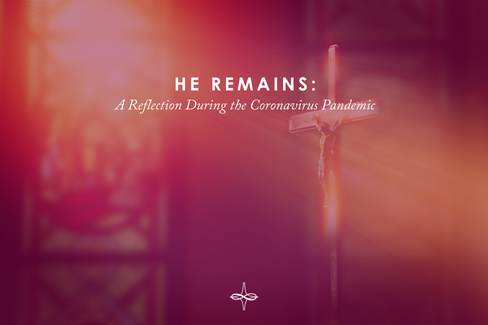

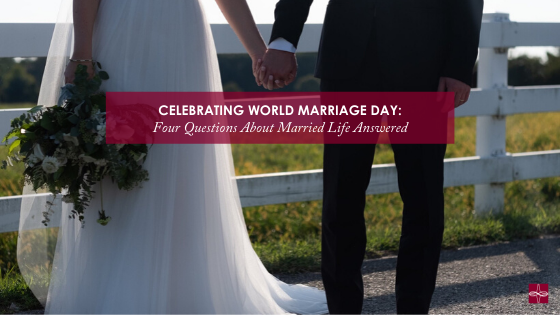


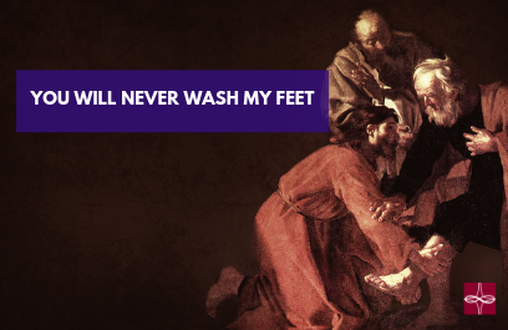



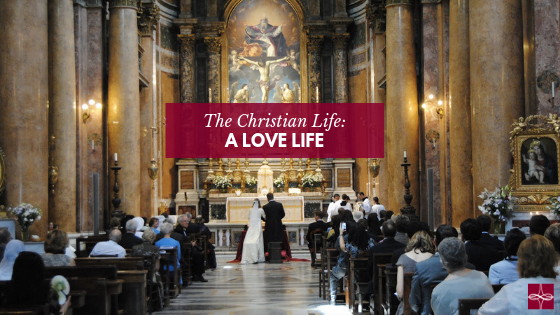

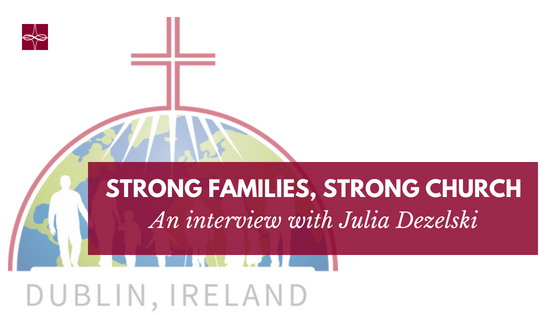
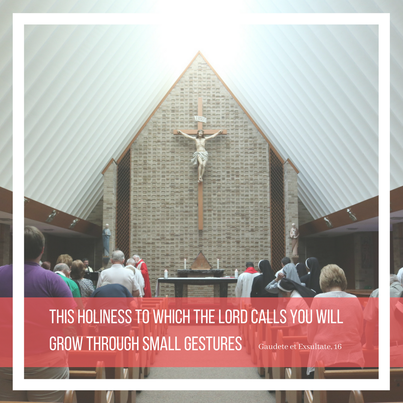
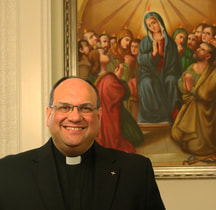
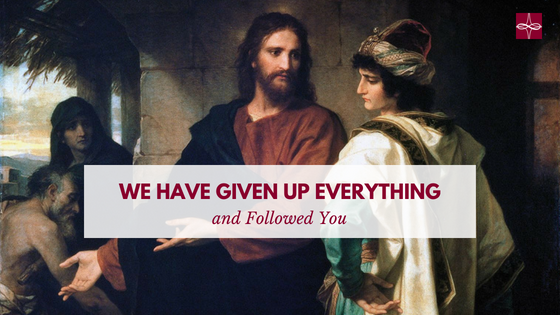
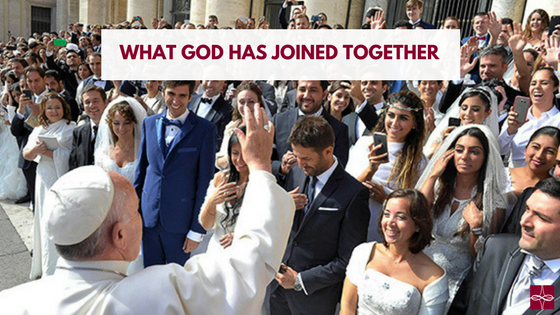

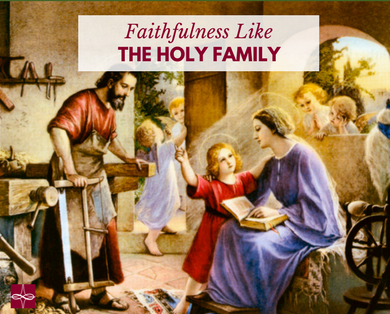
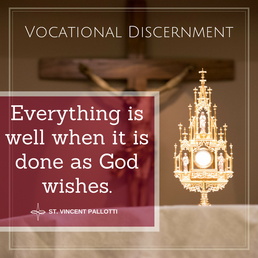
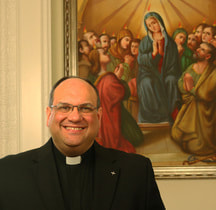
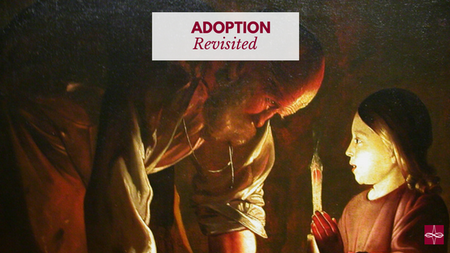

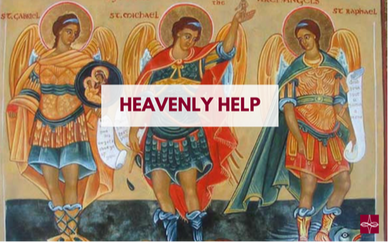

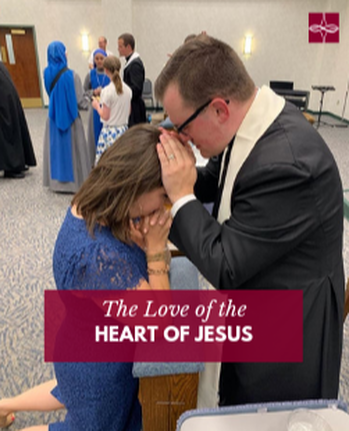

 RSS Feed
RSS Feed